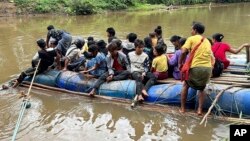Over two and a half years ago, the military seized power in Burma in a bloody coup. The regime has left Burma in ruins, with four out of five townships affected by armed clashes between the military and those that oppose its rule.
The results have been devastating, said USAID Deputy Administrator Michael Schiffer in recent Congressional testimony:
“Today, due to the military’s brutality, there are now over 1.9 million people displaced in Burma, and more than one million refugees in Bangladesh and the rest of the region. The internally displaced communities are facing increased threats of violence from the military, and facing on-going trauma due to conflict, bungled COVID response, epic mismanagement of the economy, high food prices, and frequent displacement that has severely impacted their coping capacity.”
Through USAID, the United States has led the international community’s humanitarian response to Burma and the Rohingya refugee crisis in Bangladesh by providing nearly $2.1 billion since 2017, said Deputy Administrator Schiffer:
“We deliver humanitarian assistance to the displaced conflict-affected and other vulnerable groups, including Rohingya, by leveraging partnerships with humanitarian organizations that deliver assistance to beneficiaries based on verifiable needs.”
“And although at times this work has required engagement with governing authorities in Burma,” said Deputy Administrator Schiffer, “we do so with humanitarian principles first and foremost in mind.” In Bangladesh, USAID supports emergency preparedness and response capacity of host communities in Cox’s Bazar District, including funding for humanitarian coordination, nutrition, protection and risk management.
USAID also provides emergency support to pro-democracy activists and ethnic support organizations, civil society leaders, journalists, and human rights defenders, explained Deputy Administrator Schiffer. This ongoing assistance provides a critical safety net and includes temporary safe houses, subsistence living expenses, emergency medical needs, digital and physical security, legal aid, and psychosocial support, enabling individuals and entities to continue their work for a democratic future for Burma.
“The road ahead in Burma remains challenging,” warned Deputy Administrator Schiffer. “Nevertheless, USAID remains committed to provide the people of Burma with the support they need during this crisis, prioritizing humanitarian assistance; civilian protection, including early warning and early response and support for the development and growth of governance institutions to advance U.S. policy objectives of a just, peaceful, inclusive, federal and democratic Burma.”














